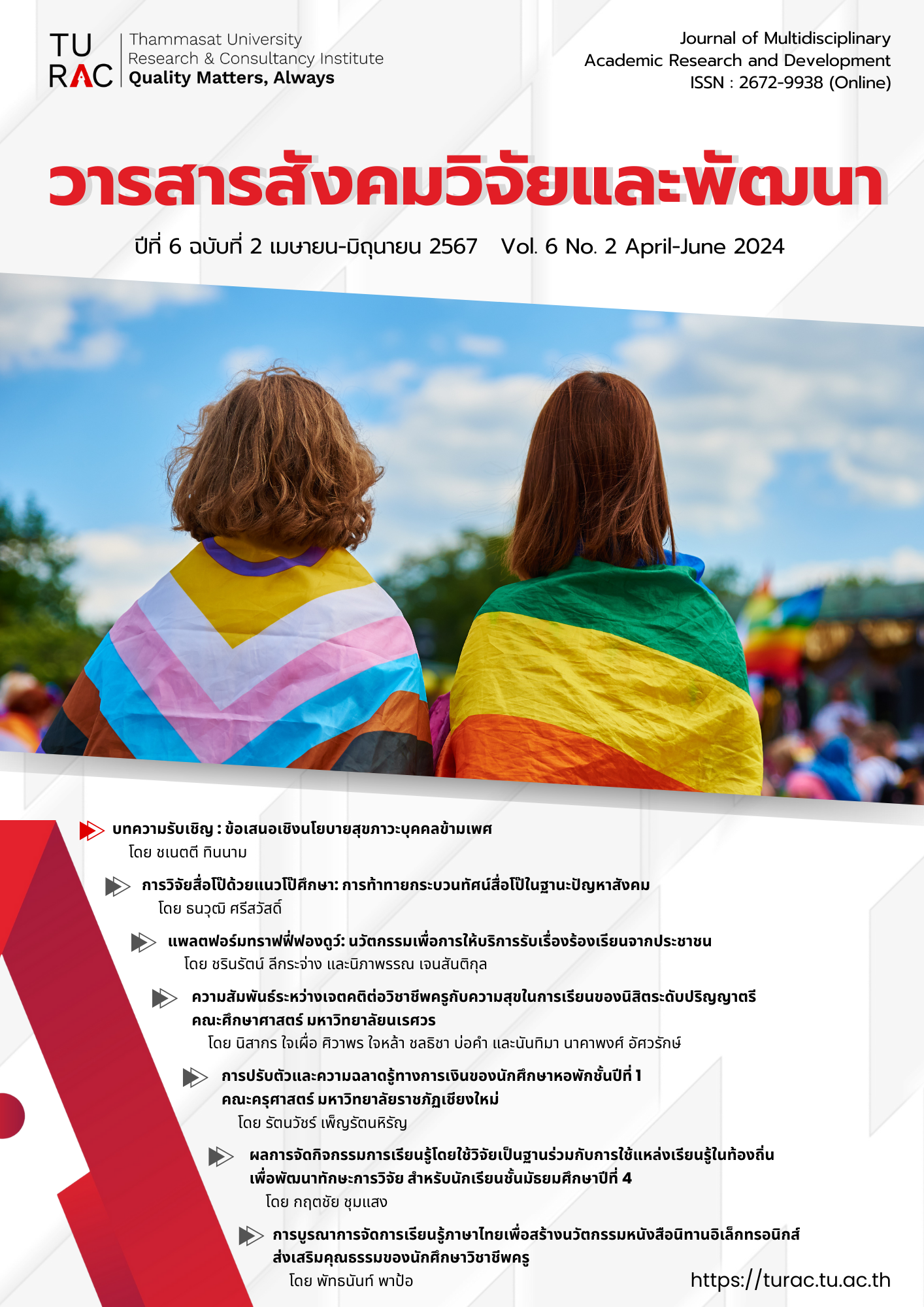Integration of Thai language learning management for Innovative electronic storybooks to foster morality among education students
Keywords:
Thai language education, Electronic storybooks, Education students, Ethical developmentAbstract
The objectives of this research were 1) “to create an electronic storybooks to promote morality of teaching profession students. 2) to study the ability to integrate Thai language learning to create innovative electronic storybooks to promote the morality of students in the teaching profession, and 3) to ask opinions about the teamwork process of teaching professional students Thai Language Department, Faculty of Education, Chaiyaphum Rajabhat University. The population used in this research was teaching professional students. Thai Language Program, Faculty of Education, Chaiyaphum Rajabhat University, 3rd year, total of 55 people. The sample group used in this research being a student of the teaching profession Thai Language Program, Faculty of Education, Chaiyaphum Rajabhat University, 3rd year enrolled in the Literary Tales Course (5002910), academic year 2022, totaling 18 students using a purposive sampling method. The research tools were 1) an assessment form for the students' ability to integrate Thai language knowledge and 2) a questionnaire on students' opinions about the teamwork process in creating an electronic storybook innovation (E-Book) to promote morality. The basic statistics used in the research were frequency distribution, percentage (%), mean () and standard deviation. The results showed: 1. Teacher professional students Thai Language Program who enrolled in the Fairy Tale Literature course created an electronic storybooks that included 8 basic virtues, totaling 8 stories. 2. Teacher professional students had the ability to integrate Thai language learning management to create innovative electronic storybooks to promote the virtues of overall, it was at the highest level. 3. The opinions of the teacher professional students about teamwork in the production of teaching innovation for electronic storybooks to promote morality as a whole were at the highest level.
References
กระทรวงศึกษาธิการ. (2552). หลักสูตรแกนกลางการศึกษาขั้นพื้นฐาน พุทธศักราช 2551. กรุงเทพฯ: โรงพิมพ์ชุมนุมสหกรณ์การเกษตรแห่งประเทศไทย จำกัด.
ทิศนา แขมมณี. (2562). ศาสตร์การสอน : องค์ความรู้เพื่อการจัดกระบวนการเรียนรู้ที่มีประสิทธิภาพ. (พิมพ์ครั้งที่ 21). กรุงเทพฯ: สำนักพิมพ์แห่งจุฬาลงกรณ์มหาวิทยาลัย.
นิภา กู้พงษ์ศักดิ์. (2556). การบูรณาการความรู้ทักษะการใช้ภาษาไทย การเสริมสร้างคุณธรรมและความคิสร้างสรรค์ผ่านสื่อ DVD. วารสารสถาบันวัฒนธรรมและศิลปะ, มหาวิทยาลัยศรีนครินทรวิโรฒ. 15(1), 77-86.
ผ่องศรี วาณิชย์ศุภวงศ์. (2546). ระเบียบวิธีทางการศึกษา. (พิมพ์ครังที่ 4). ปัตตานี: มหาวิทยาลัยสงขลานครินทร์ วิทยาเขตปัตตานี.
พัฒนา จันทนา. (2542). พฤติกรรมการสอนของนักศึกษาฝึกประสบการณ์วิชาชีพ สาขาวิชาเอกสังคมศึกษา. เชียงใหม่: ภาควิชามัธยมศึกษา คณะศึกษาศาสตร์ มหาวิทยาลัยเชียงใหม่.
พัทธนันท์ พาป้อ. (2565). เอกสารประกอบการสอนรายวิชา 5052910 วรรณกรรมนิทาน. ชัยภูมิ: คณะครุศาสตร์ มหาวิทยาลัยราชภัฏชัยภูมิ.
สาขาวิชาภาษาไทย คณะครุศาสตร์ มหาวิทยาลัยราชภัฏชัยภูมิ. (2562). มคอ.2 หลักสูตรครุศาสตรบัณฑิต สาขาวิชาภาษาไทย (ปรับปรุง) พ.ศ. 2562. ชัยภูมิ: มหาวิทยาลัยราชภัฏชัยภูมิ.
สร้างสรรค์ กระตุฤกษ์, พัทธนันท์ พาป้อ, ปพิชญา พรหมกันธา และปุ่น ชมภูพระ. (2565). ความพึงพอใจของนักศึกษาที่มีต่อการใช้สื่อ และนวัตกรรมส่งเสริมการอ่าน. The New Viridian Journal of Arts, Humanities and Social Sciences. 2(3), 45-60.
หนึ่งฤทัย มะลาไวย์, อรพินทร์ ชูชม และนริสรา พึ่งโพธิ์สภ. (2565). ศึกษาการทำงานเป็นทีมของนักเรียน: ปัจจัยเชิงสาเหตุ ข้อเสนอแนะในการวิจัย. Journal of Roi Kaensarn Academi. 7(3), 425-438.
Partnership for 21st Century Skills. (2009). 21st Century Support Systems. Retrieved from www. 21 stcenturyskills.org/route21/index.
Downloads
Published
How to Cite
Issue
Section
License
Copyright (c) 2024 Journal of Multidisciplinary Academic Research and Development (JMARD)

This work is licensed under a Creative Commons Attribution-NonCommercial-NoDerivatives 4.0 International License.



